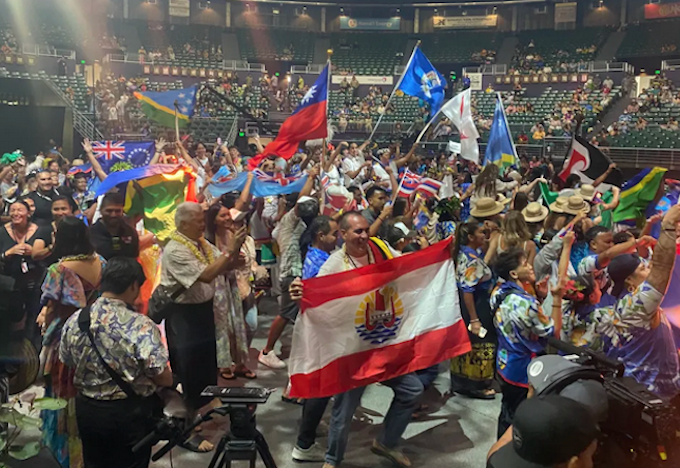
The director of the Festival of Pacific Arts and Culture Dr Aaron Sala says “it’s up to all Pacific nations and their ancestors to stay united”.
The remarks come during the closing ceremony of the 13th Festival of Pacific Arts and Culture (FestPAC) happening at the University of Hawai’i at Manoa.
During the ceremony, delegations from 25 nations and thousands of people packed the venue.
A standing ovation and special acknowledgement was made to Kanaky, Vanuatu and West Papua.
FestPAC serves as a platform for Pacific island nations to showcase their rich heritage and artistic talents.
The event roots trace back to the 1970s when Pacific Island nations commenced discussion on the need to preserve and promote their unique cultural identities.
Dr Sala said it was important to maintain the strength of connection going forward once the event ends.
‘Our responsibility’
“It is our responsibilty to not step away from the table,” he said.
“All of the ancestors, you also have a responsibility to make sure that we don’t fall away from the table again.”
‘Like the tifa kundu drum, the harder you hit us, the louder we become’
With its multifaceted roles, the tifa is a cornerstone of the identity and spiritual connection of many Melanesia kin.
Thankyou #MissPacific Moemoana for the shoutout and Aotearoa delegations.#FestPAC2024 pic.twitter.com/tpS5P8n2QI
— Ronny Kareni (@ronnykareni) June 14, 2024
He addressed the crowds and said his hope for this festival was one of legacy and influence and hopes it will inspire generations to combat the pressing issues Pacific populations are facing such as the impacts of climate change.
“Perhaps the most important part of this fesitival is when a 10-year-old born to Palaun parents was able to visit his people and in 20 years is getting a PhD in ocean science because he is concerned about the ocean around Palau.”
Meanwhile, Emile Kairua, hailing from the Cook Islands, becomes the next festival director for the 14th FestPac which will be held in New Caledonia in 2028.
“I invite everyone around the world if you are Pasifika, start preparing for FestPac14. Let us all back the next family reunion in 2028 — the biggest and the best,” Kairua said.
This article is republished under a community partnership agreement with RNZ.












































